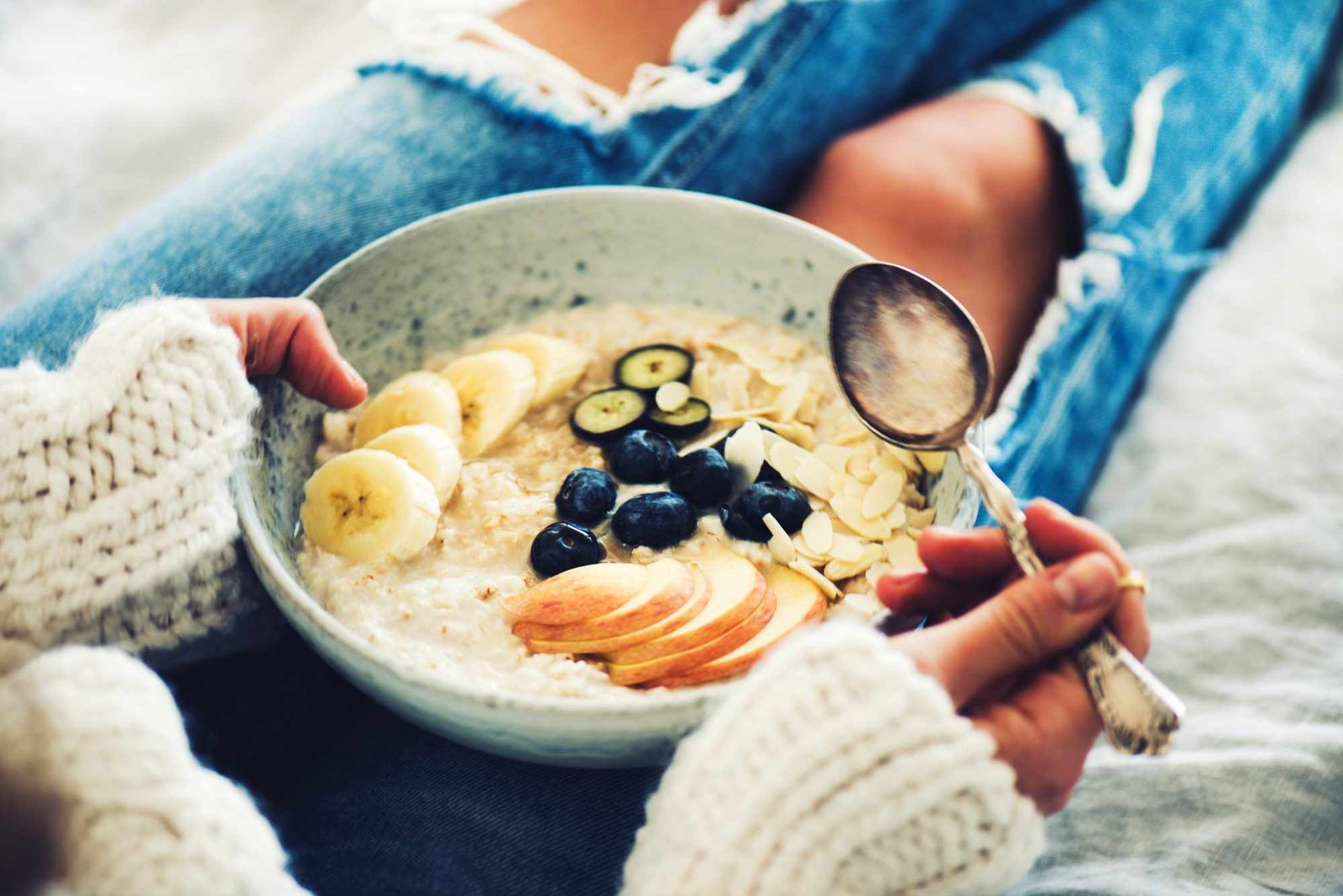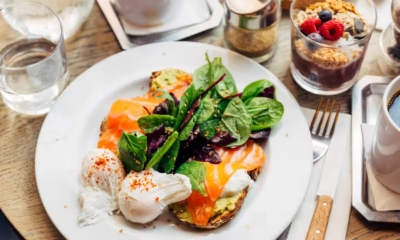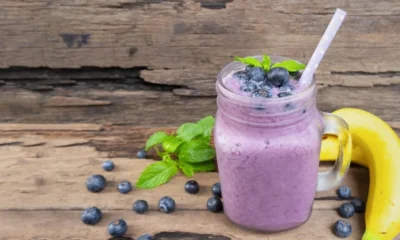Health & Nutrition
Start Your Day Right with These Super Healthy Breakfast Foods
From fiber-rich oats to protein-packed eggs, discover nutritious breakfast options that keep you full and energized all morning.

Breakfast isn’t just the first meal of the day—it sets the tone for everything that follows. Nutritionists around the world agree that choosing wholesome, nutrient-dense foods in the morning can boost your mood, fuel your brain, and help you make healthier choices throughout the day. So what should you really be eating for breakfast to feel your best?
Let’s start with an all-time favorite: oatmeal. This humble bowl of whole grains is praised for being rich in soluble fiber, which helps control cholesterol and keeps you feeling satisfied for hours. According to health experts, adding a sprinkle of nuts, fresh berries, or a drizzle of honey can transform plain oats into a delicious and antioxidant-packed powerhouse.
Greek yogurt is another breakfast champion. Packed with probiotics and double the protein of regular yogurt, it supports gut health while keeping hunger at bay. Many dietitians suggest pairing it with sliced bananas or chia seeds for a creamy, nutritious bowl that feels like a treat yet fuels you for hours.
If you prefer something savory, eggs are a classic choice. Scrambled, poached, or hard-boiled, eggs deliver high-quality protein and essential nutrients like choline, which is vital for brain health. According to fitness trainers, eggs help stabilize blood sugar and can curb mid-morning snack cravings—making them an ideal addition to a balanced breakfast plate.

For those always on the move, a smoothie bowl can be a fun way to sneak in fruits, greens, and superfoods. Blend spinach, frozen berries, a spoonful of nut butter, and a splash of almond milk for a vibrant, nutrient-rich breakfast that tastes more like dessert than a health food. Many busy professionals say this quick meal keeps them energized without the mid-morning crash.
Last but not least, whole-grain toast topped with avocado is a modern breakfast hero. Avocado is loaded with healthy fats, fiber, and potassium—nutrients that support heart health and keep you full longer. Fitness influencers swear by this combination for a reason: it’s quick, customizable, and absolutely delicious.
So tomorrow morning, skip the sugary cereals and pastries. Reach for these wholesome choices instead and notice how your energy and focus soar. A healthy breakfast isn’t just about losing weight; it’s about nourishing your body and mind to tackle the day with confidence.
Health & Nutrition
Scientists Reveal the Real Secret to Aging Well and It’s Already in Your Kitchen
A new study shows that flavonoid-rich foods like tea, berries, and apples can help you stay strong and sharp well into old age

Forget expensive creams, trendy supplements, or complicated biohacks — researchers are now saying the key to aging gracefully might just be in your fridge or teacup. A major new study from Edith Cowan University, Queen’s University Belfast, and Harvard T.H. Chan School of Public Health is flipping the script on what it means to stay sharp and strong in your later years. Their advice? Eat more flavonoids.
Published in the American Journal of Clinical Nutrition, the study tracked the diets and health outcomes of over 86,000 adults — both men and women — across 24 years. Researchers found that people who regularly consumed flavonoid-rich foods had significantly lower risks of frailty, physical decline, and poor mental health as they aged. Women, in particular, saw a 15% lower risk of becoming frail and a 12% drop in cognitive decline simply by eating more flavonoids.
So what are flavonoids, and why should you care? Flavonoids are powerful plant compounds found in colorful fruits, vegetables, teas, and even red wine. They’re known to fight oxidative stress, reduce inflammation, and support both brain and muscle health — all of which are essential for maintaining strength, agility, and memory in your golden years.
Professor Aedin Cassidy from Queen’s University Belfast, one of the study’s senior authors, explained, “Our research shows that people who consume more flavonoids tend to age better. These nutrients support blood vessels, reduce inflammation, and even help preserve muscle mass — all crucial for staying mobile and mentally sharp.”
Among the top flavonoid-packed foods that stood out in the study: black tea, apples, blueberries, oranges, and red wine. Black tea, in particular, was singled out as a standout performer in reducing aging-related risks. Participants who added just three extra servings of flavonoid-rich foods daily saw a 6% to 11% reduction in multiple age-related outcomes. For men, mental health showed the biggest benefit, with a 15% lower risk of decline.
But it doesn’t stop there. According to supporting research published in the Journal of Nutritional Science, flavonoids come in many subtypes with a wide range of sources. Flavonols are found in onions, kale, tomatoes, and lettuce. Flavones pop up in parsley, celery, and red peppers. And anthocyanins — the pigments behind vibrant fruits — are abundant in berries, red grapes, and cranberries.
The researchers also emphasized the importance of pairing these foods with protein for optimal results. “Higher protein intake, especially when combined with a plant-based diet, consistently supports better outcomes for aging,” noted Professor Eric Rimm of Harvard. It’s not about following a rigid diet — it’s about making simple, sustainable tweaks that pay off in the long run.
So next time you’re building a grocery list or planning your meals, think beyond just calories and carbs. Think color, variety, and a little black tea on the side. Because healthy aging might be less about genetics and more about what’s on your plate.
Health & Nutrition
Your Morning Smoothie Might Be Destroying the Nutrients You Think You’re Getting
New research reveals that adding bananas to your smoothie could slash your nutrient absorption by over 80%

For health-conscious people, few rituals feel as virtuous as blending a morning smoothie packed with fruits, vegetables, and supplements. It’s colorful, convenient, and loaded with vitamins — or so you thought. A groundbreaking new study now suggests that one popular smoothie ingredient might be sabotaging your efforts in a way no one saw coming: the humble banana.
Highlighted in SciTechDaily and published in Food and Function, the research explores the powerful yet often overlooked role of an enzyme called polyphenol oxidase (PPO). This enzyme, commonly found in fruits that brown when exposed to air — like apples and bananas — is shown to drastically reduce the body’s ability to absorb flavan-3-ols, a potent class of antioxidants known for boosting heart and brain health, especially as we age.
According to the study, conducted by a team of researchers at the University of Reading and featured again by Food & Wine, smoothies made with high PPO fruits (like bananas) blocked the body’s ability to absorb flavanols by a shocking 84% when compared to smoothies made with low PPO fruits like berries. Even when consumed with a gap — taking alternating sips — the flavanol absorption still plummeted. In short, your antioxidant-rich berries could be rendered nearly useless by a single banana in the blender.
Professor Gunter Kuhnle, a lead nutrition expert and co-investigator of the study, explained, “We know flavanols break down when exposed to PPO, but even we were surprised by the scale of nutrient loss from just one banana.” This finding is especially significant given that flavanols are tied to benefits like reduced risk of frailty and improved cognitive health in older adults — with stronger results observed in women.
To conduct the experiment, researchers observed volunteers who consumed three different test combinations: smoothies made with bananas (high PPO), smoothies made with mixed berries (low PPO), and flavanol supplements taken in capsule form. Blood samples revealed that the banana-based smoothie had significantly reduced bioavailability of the flavanols, essentially stripping away the very benefits people were hoping to gain.
So what’s the solution? According to the research team, it’s not about giving up bananas entirely — it’s about strategic pairing. “If you want to maximize the flavanol content of your smoothie, pair antioxidant-rich berries with ingredients like mango, pineapple, orange, or even yogurt, which all contain low PPO activity,” Kuhnle advises.
The takeaway is simple yet powerful: not all fruit combos are created equal. That innocent banana could be undoing the benefits of your nutrient-packed breakfast drink. So if you’re sipping a smoothie to support heart health, brain function, or graceful aging, it might be time to give your blender a PPO-friendly makeover.
-

 US News1 week ago
US News1 week ago“She Never Made It Out…” Albany House Fire Claims Woman’s Life as Family Pleads for Help to Bring Her Home
-

 Entertainment7 days ago
Entertainment7 days agoXG Star Cocona Shares a Brave Truth at 20 — “I Was Born Female, But That Label Never Represented Who I Truly Am…”
-

 Entertainment7 days ago
Entertainment7 days agoSamba Schutte Reveals the Surprise Cameo in Pluribus That “Nobody Saw Coming”… and Why John Cena Was Perfect for the Role
-

 Tech1 week ago
Tech1 week agoAfter Losing Over $70 Billion, Mark Zuckerberg Finally Admits His Biggest Bet Is “Not Working” – Meta Plans Massive Cuts to Metaverse Budget
-

 Entertainment1 week ago
Entertainment1 week agoNika & Madison stuns global audiences as director Eva Thomas reveals why “resilience, not fear, drives Indigenous women on the run”
-

 Entertainment5 days ago
Entertainment5 days agoSaudi Arabia’s entertainment revolution… Red Sea Film Foundation CEO Faisal Baltyuor says he ‘wears many hats’ — but one mission drives them all
-

 Sports5 days ago
Sports5 days agoDodgers Stun MLB With Blockbuster Move, Sign Elite Closer Edwin Díaz to Three-Year, $69 Million Deal
-

 Entertainment5 days ago
Entertainment5 days agoTeyana Taylor wakes up to a Golden Globe call at 5 a.m.… ‘Am I dreaming right now?’ — and why she’s already begging Paul Thomas Anderson for more




















